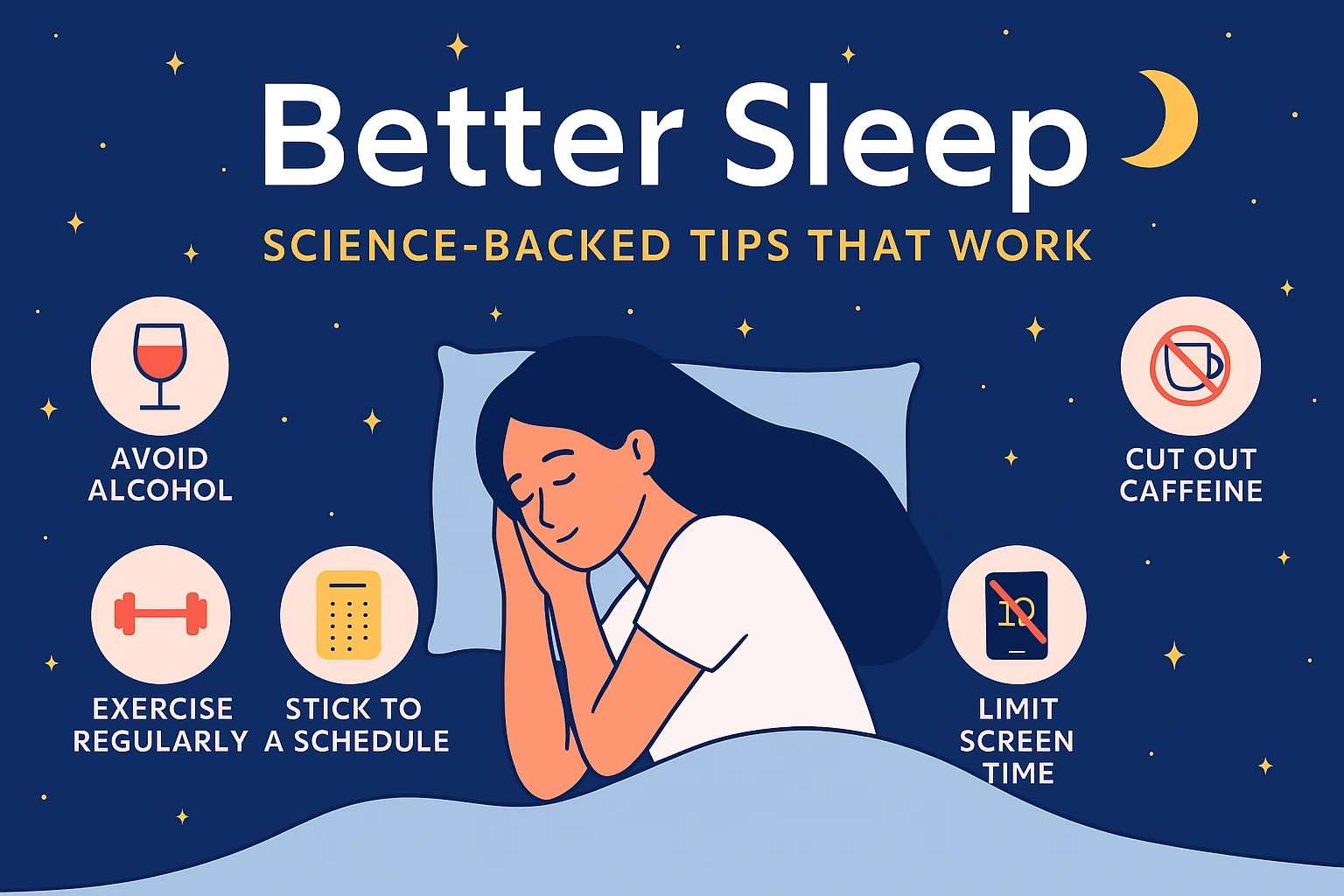Better Sleep
Sleep is essential for overall health and well-being. In fact, quality rest influences everything from mood to cognitive function. However, many people struggle with getting enough shut-eye in today’s fast-paced world. Fortunately, science offers proven strategies to improve sleep. This article explores practical, evidence-based tips that can transform your nightly routine. By implementing these changes, you can wake up feeling refreshed and energized. Moreover, understanding the science behind them empowers you to make informed decisions.
First, consider how poor sleep affects daily life. Studies show that chronic sleep deprivation links to increased risks of heart disease, diabetes, and mental health issues. Therefore, prioritizing quality rest is not just a luxury—it’s a necessity. Additionally, simple adjustments can yield significant results. For instance, aligning your habits with your body’s natural rhythms promotes deeper rest. As we delve into these tips, remember that consistency is key. Over time, these practices build healthier sleep patterns.
Personalization is key—what helps one person may need adjustment for another. Still, beginning with core advice provides a solid foundation. In the next sections, we’ll share science-backed tips from trusted sources, complete with explanations and practical steps. By the end, you’ll have a clear toolkit to enhance your rest.

Table of Contents
- Establish a Consistent Sleep Schedule
- Optimize Your Sleep Environment
- Limit Exposure to Blue Light
- Incorporate Regular Exercise
- Watch Your Diet and Substances
- Develop a Bedtime Routine
- Manage Stress Effectively
- Nap Strategically
- Get Morning Sunlight
- Avoid Overstimulating Activities
- Monitor and Adjust Habits
- Conclusion
- FAQ
Better Sleep
One of the most effective ways to improve rest is maintaining a regular schedule. Go to bed and wake up at the same time every day, even on weekends. This reinforces your body’s internal clock, known as the circadian rhythm. Consequently, falling asleep becomes easier over time.
Research supports this approach. For example, consistent wake-up times help the body adapt to a healthy routine. Moreover, aiming for at least seven hours of sleep is crucial for adults. The American Academy of Sleep Medicine recommends this amount to support optimal health. Therefore, calculate your bedtime by working backward from your wake-up time.
Additionally, avoid shifting your schedule drastically. Sudden changes can disrupt your rhythm, leading to grogginess. Instead, make gradual adjustments if needed. For shift workers, this might be challenging, but consistency within possible limits still helps.
In practice, set alarms for both bedtime and wake-up. Use reminders on your phone to wind down. Over weeks, you’ll notice improved sleep quality. However, if insomnia persists, consult a doctor.
Optimize Your Sleep Environment
Creating an ideal bedroom setup is vital for restful sleep. Keep the room cool, dark, and quiet. Ideally, set the thermostat to 65-68 degrees Fahrenheit. This temperature range supports the body’s natural drop in core temperature during sleep.
Furthermore, block out light using blackout curtains or a sleep mask. Too much light disrupts melatonin production, the hormone responsible for regulating sleep.
Better Sleep
Similarly, minimize noise with earplugs, a fan, or white noise machines. These tools drown out disturbances effectively.
Moreover, reserve the bed for sleep and intimacy only. Avoid working or watching TV there. This conditions your brain to associate the bed with rest. As a result, you’ll fall asleep faster.
Invest in comfortable bedding too. A supportive mattress and pillows prevent discomfort. Research indicates that quality bedding reduces aches and enhances rest. Therefore, evaluate your setup periodically.
Finally, declutter the space. A tidy room promotes relaxation. By making these changes, your environment becomes a sleep sanctuary.
Limit Exposure to Blue Light
In the evening, reduce screen time from devices like phones and laptops. Blue light from screens suppresses melatonin, making it harder to sleep. Therefore, disconnect at least an hour before bed.
Instead, opt for relaxing activities like reading a physical book. This shift helps your mind unwind. Additionally, use night mode settings if you must use devices. These filters reduce blue light emission.
However, for best results, avoid electronics altogether in the bedroom. Charge them elsewhere to remove temptation. Studies show this practice improves sleep onset.
Moreover, during the day, seek natural light exposure. At least 30 minutes outdoors regulates your circadian rhythm. Consequently, you’ll feel more alert daytime and sleepier at night.
If natural light is scarce, consider light therapy boxes. Consult a professional first. By balancing light exposure, you support healthier sleep cycles.
Incorporate Regular Exercise
Physical activity is a powerful aid for restful sleep. Aim for at least 20-30 minutes daily, but not too close to bedtime. Exercise promotes deeper rest by influencing energy levels and body temperature.
For example, moderate activities like walking or yoga work well. They reduce stress and improve mood. However, intense workouts late can be stimulating, so schedule them earlier.
Research from Harvard confirms that regular exercise improves sleep quality. Additionally, outdoor exercise doubles benefits by providing sunlight exposure.
Therefore, integrate movement into your routine. Start small if you’re inactive. Over time, you’ll notice easier sleep initiation.
But remember, consistency matters more than intensity. Even light activity helps. If you have health concerns, check with a doctor first.
Watch Your Diet and Substances
What you consume affects sleep profoundly. Avoid caffeine and nicotine at least four to six hours before bed. These stimulants linger in your system, disrupting rest.
Similarly, limit alcohol. While it may induce drowsiness initially, it fragments sleep later. Therefore, moderate intake or avoid it evening hours.
Moreover, don’t eat heavy meals close to bedtime. Digestion can cause discomfort. Opt for light snacks if hungry, like bananas or nuts.
Hydration is important, but reduce fluids before bed to minimize bathroom trips. Balanced eating supports steady blood sugar, aiding rest.
Furthermore, some foods promote sleep. Cherries contain melatonin, while almonds provide magnesium. Incorporate them wisely.
Develop a Bedtime Routine
A relaxing pre-sleep ritual signals your body it’s time to wind down. Spend 30 minutes on calming activities like stretching or meditation.
For instance, try deep breathing exercises. They activate the parasympathetic nervous system, promoting relaxation. Studies show mindfulness reduces insomnia symptoms.
Additionally, journaling worries helps clear your mind. Write down concerns and solutions for tomorrow.
However, keep it consistent. Repeat the same steps nightly. This builds a habit loop for improved rest.
Include dim lighting to enhance melatonin production. Over time, this routine shortens sleep latency.
Manage Stress Effectively
Stress is a major obstacle to restful sleep. Practice techniques like meditation or yoga to unwind. These lower cortisol levels, facilitating rest.
Moreover, progressive muscle relaxation involves tensing and releasing muscles. It’s proven to ease anxiety before bed.
If worries persist, try gratitude journaling. Focusing on positives shifts mindset. Research links this to improved rest.
Additionally, set boundaries. Avoid work emails evening hours. This separation aids mental detachment.
Therefore, build a stress management toolkit. Consistent use leads to calmer nights and enhanced sleep.
For more on managing stress, explore our article on Mental Health in the Digital Age.
Nap Strategically
Naps can refresh, but handle them carefully. Limit to 20-30 minutes, early afternoon. Longer naps disrupt nighttime sleep.
For example, a short power nap boosts alertness without grogginess. However, avoid late naps.
If you work nights, strategic napping compensates for sleep debt.
Moreover, listen to your body. If overly tired, a brief rest helps. But don’t make it habitual if it affects evenings.
By napping wisely, you maintain overall sleep balance.
Get Morning Sunlight
Exposure to natural light upon waking resets your circadian rhythm. Aim for 30 minutes outdoors. This suppresses melatonin daytime, promoting wakefulness.
Consequently, you’ll feel sleepier at night. If weather hinders, sit by a window.
Studies show light therapy aids those with disrupted rhythms, like shift workers.
Additionally, combine with breakfast for a routine boost. This habit enhances energy levels.
Therefore, prioritize morning light for synchronized sleep cycles.
Avoid Overstimulating Activities
Before bed, steer clear of exciting content like thrillers or arguments. These elevate adrenaline, hindering rest.
Instead, choose soothing options. Gentle music or podcasts work well.
Moreover, dim lights gradually. This mimics sunset, cueing sleep hormones.
If you must address issues, do so earlier. Evening calm is crucial.
By curating pre-bed activities, you foster a peaceful transition to sleep.
Monitor and Adjust Habits
Track your sleep with a journal or app. Note patterns and triggers.
For instance, record caffeine intake and sleep quality. Adjust accordingly.
Furthermore, review weekly. Small tweaks compound over time.
If problems persist, seek professional help. Conditions like apnea need attention.
Therefore, self-monitoring empowers better rest management.
Learn how technology can aid monitoring in our article on Remote Patient Monitoring with IoT in 2026.
Conclusion
Better Sleep
Implementing these science-backed tips can revolutionize your rest. Start with a few, build gradually. Consistency yields results. Moreover, quality sleep enhances life quality. Remember, it’s an investment in health.
However, individual needs vary. Listen to your body, consult experts if needed. With persistence, restful nights await.
For more health tech insights, check out AI and Telemedicine: Smarter Virtual Healthcare or AI in Healthcare: From Diagnosis to Drug Discovery.
FAQ
Better Sleep
What are the best science-backed tips for better sleep?
Key tips include maintaining a consistent schedule, optimizing your environment, limiting blue light, exercising regularly, watching diet, developing routines, managing stress, napping strategically, getting morning light, avoiding overstimulation, and monitoring habits. Each is supported by research from sources like Sleep Foundation and Mayo Clinic.
How much sleep do adults need?
Adults should aim for at least seven hours nightly. This supports health and prevents deprivation risks.
Why is blue light bad for sleep?
Blue light suppresses melatonin, disrupting circadian rhythms. Reduce exposure evenings for better rest.
Can exercise improve sleep?
Yes, regular activity promotes deeper rest, but avoid intense sessions near bedtime.
What foods help with sleep?
Foods like cherries (melatonin) and almonds (magnesium) aid sleep. Avoid heavy meals late.
How does stress affect sleep?
Stress raises cortisol, making relaxation hard. Techniques like meditation help.
Are naps good or bad?
Short, early naps refresh without disrupting night sleep.
Why get morning sunlight?
It resets your internal clock, improving sleep-wake cycles.
What if I can’t fall asleep?
Leave bed after 20 minutes, do relaxing activities, then try again.
When to see a doctor for sleep issues?
If insomnia lasts weeks or affects daily life, consult a professional.


